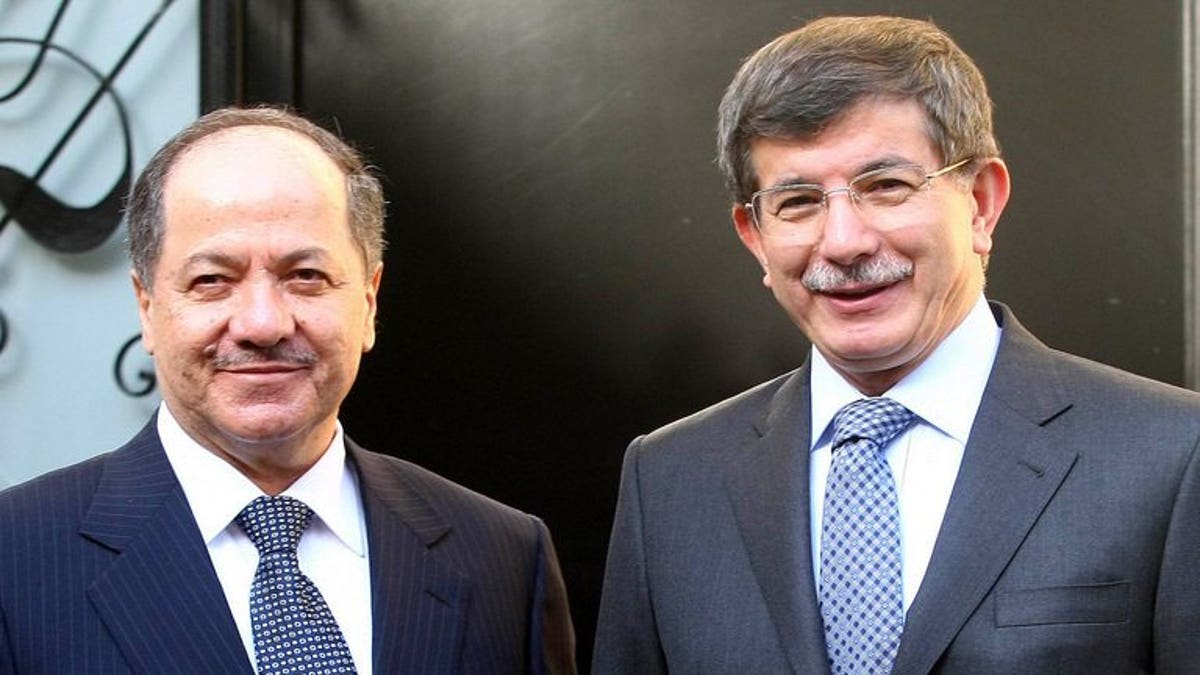
Massud Barzani (left) with Turkish Foreign Minister Ahmet Davutoglu in Ankara last October. Iraqi Kurdish lawmakers agreed on Sunday to delay controversial presidential polls for two years as they sparred over whether to allow regional leader Massud Barzani to stand for another term in power. (AFP/File)
ARBIL, Iraq (AFP) – Iraqi Kurdish lawmakers agreed on Sunday to delay controversial presidential polls for two years as they sparred over whether to allow regional leader Massud Barzani to stand for another term in power.
Parliamentary and provincial elections due September 21 will go ahead as planned, but the delay to the presidential polls are the latest step in a months-long battle between the two regional hegemons and opposition parties over whether Barzani, the dominant figure in the autonomous three-province region, can remain in office.
The opposition argues Barzani has served the maximum-allowable two terms in office, but the dominant Kurdistan Democratic Party (KDP) and its smaller partner the Patriotic Union of Kurdistan (PUK) have pushed for a referendum on a new constitution which would, if approved, allow him to serve up to two more.
On Sunday, the standoff reached a head, with opposition lawmakers throwing water bottles and fistfights breaking out in the Kurdish regional parliament, before a delay to the presidential elections was eventually approved.
"The Kurdish parliament approved delaying presidential elections for two years," said Omar Sadiq, an MP loyal to Barzani's KDP. "The election on September 21 will be for parliament and the provincial councils only."
He said the delay was to give time for the Kurdish region's political parties to reach agreement on the Kurdish constitution, which was passed by lawmakers in 2009 but never put before a requisite public referendum.
Opposition MPs, however, criticised the delay.
"We do not trust them," Bayan Ahmed, an opposition member of the Kurdistan Islamic Union, told AFP, referring to the KDP and PUK.
"There is no reason for this delay because the date for the elections is already fixed."
The KDP and the PUK, headed by ailing Iraqi President Jalal Talabani, have largely held a duopoly in Kurdish politics and have even run on a joint slate in recent elections.
Together, the two parties hold a majority of seats in Kurdistan's 111-seat regional parliament.
Barzani, the son of revered Kurdish nationalist leader and KDP founder Mulla Mustafa Barzani, has enjoyed tremendous popularity in the region, winning 69.6 percent of votes in the most recent presidential election in 2009.
Kurdistan is held up as a paradigm of economic growth and stability in a country still beset by deadly violence and chronic political crises, but critics say its two main parties blur the lines between state office and their own party bureaucracies, fostering nepotism and corruption.
In February, Human Rights Watch accused Kurdish authorities of stifling free speech and detaining journalists, activists and political opponents without charge.
